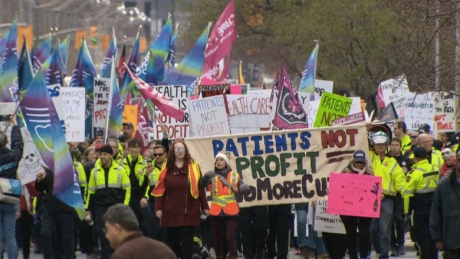Fight Ford!
You are here
Together we can stop Ford's plan to destroy public healthcare

December 2, 2022
Over 270 people joined an online Emergency Town Hall meeting for Toronto on November 29, one of a series of online town halls organized by the Ontario Health Coalition across the province.
These meetings are being held to carry out an action plan to fight the privatization of public hospitals in Ontario, a project the Ford government is pursuing full steam ahead, in spite of how this initiative will worsen the already dire situation of public health care for the majority.
The meeting began with short presentations by health care workers (a doctor, a nurse and a paramedic), a mother whose child depends on emergency and critical care for her life-threatening condition, and the Executive Director of OHC, Natalie Mehra.
The health care workers all spoke of unconscionable delays treating patients because of the crisis in health care. Dr. Raghu Venugopal, an Emergency doctor, talked about a patient with chest pains waiting eight hours to see someone. He argued we need a chorus of voices to make the government back down, referring to the recent struggle of education workers which got the government to back down on Bill 28.
Karen McKay Eden, a registered nurse and Vice President of Region 3 of the ONA (Ontario Nurses’ Association) spoke about the crisis in nursing, due to low pay, long hours and not enough staff, as well as the fact that private nursing firms are luring workers from the public system with higher salaries – another way to undermine the provision of public health care.
But she was nonetheless hopeful about the possibility of fighting back, especially because of the recent striking down of Bill 124, the Ford government bill attempting to make all workers pay by limiting wage increases to 1%, which in effect translates into deep wage cuts. Ontario’s Superior Court of Justice struck down Doug Ford’s public sector wage cap as unconstitutional Nov 29, in a major defeat for the Conservative premier.
She argued that together we can stop Ford in his tracks if workers, patients and the public get together.
According to McKay Eden “Ford took an understaffed system and made it worse. The most broken parts of the system are the parts that have been privatized.”
Nicole Payette-Kyryluk, mother of an 11-year old daughter who needs constant care for her medically fragile child waited 21 hours for care in a hospital emergency room. She describes being scared to death to take her daughter back to an understaffed Emergency department.
Like other speakers at the online meeting, Payette-Kyryluk said ‘We have to be a united front to win.”
Charles Labelle, who also spoke at the meeting, described himself as a proud paramedic, working in Toronto for 17 years.
He described a typical workday, taking in a patient with an asthma attack and seeing the patient left waiting in the hallway. He said at any one time there can be up to 12 people waiting in the hallways to be seen. This puts the lie to Ford’s promise in 2018 that “it would be the end of hallway medicine”.
Labelle described how many paramedics are burning out with no breaks and no lunches because there are simply not enough staff to do the job.
There is also an increasing shortage of ambulances to respond to 911 calls and a growing frequency of 0 ambulance availability when calls come in.
Average response times are now about 13 minutes. Optimal response times, with the best outcomes for patients, are 6 minutes, especially in critical situations such as heart attacks.
Labelle pleaded that health care workers need the support of the public, who depend on these services, to sound the alarm and push back the Ford governments privatization agenda: “It’s obvious to us that the people we serve – at least 70% of the people we currently serve – are in no position to pay for private care.”
Natalie Mehra, Executive Director of Ontario Health Coalition, for over 20 years, describes the situation as the veritable collapse of the health care system in Ontario, the worst she has ever seen.
At one point over 80 emergency departments were closed because of inadequate staffing. There have never been 80 emergency department closures in the history of Ontario.
The same crisis exists in long-term care, which was the plan of both the Harris and Ford governments, who created private long-term care facilities to boost the profits of themselves and their cronies.
Currently 67% of long-term care beds in Ontario are in for-profit institutions.
As Mehra described, we went into the pandemic with 30 years straight of cutting in the hospitals. This is reflected in statistics compiled by OHC. For example, Ontario has the lowest number of hospital beds per capita in the whole country and is last as well in public hospital funding per capita.
Mehra underlined the fact that this is not incompetence on the part of the Ford government. It is intentional starving of public health care budgets and staffing to pave the way for further privatization and profits.
And Ford’s intentions are no secret. He doubled the funding of for-profit clinics this past spring, at the same time as he is effectively orchestrating the destruction of public healthcare.
The situation is critical for the future of our public health care system. As Nicole Payette-Kyryluk said we need a united front of health care workers, patients and all of us who depend on public health care for ourselves and our families. The overwhelming message of this meeting, coming from both speakers and participants, is that we can defeat Ford and defend our hard-won public healthcare system.
First of all, he was elected by just over 17% of eligible voters; this is not a mandate. He was pushed back in a big way by education workers who forced him to dismantle Bill 28 and his plans to run roughshod over workers’ collective bargaining rights. Now another blow has been struck by the court’s overturning of Bill 124, Ford’s attempt to make workers pay for his government’s greed.
There are several elements of OHC’s campaign, which are being rolled out in communities large and small across the province.
Things you can do:
Go to the OHC website and sign up to today to become an active defender of public healthcare: https://www.ontariohealthcoalition.ca/index.php/events-hospital-emergency-town-hall-meetings/
Download OHC flyers and fact sheets to get the word out about the campaign to stop privatization – at subway stations, community organizations, neighbourhoods, etc.
Join one of the upcoming rallies to stop Ford’s privatization plan! In Toronto, all out to the emergency rally Monday December 12 at 12 noon outside Toronto General Hospital, 585 University Avenue (University & College).
Section:
Topics:










